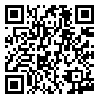Volume 7, Issue 3 (9-2014)
IJMEHM 2014, 7(3): 36-47 |
Back to browse issues page
Download citation:
BibTeX | RIS | EndNote | Medlars | ProCite | Reference Manager | RefWorks
Send citation to:



BibTeX | RIS | EndNote | Medlars | ProCite | Reference Manager | RefWorks
Send citation to:
Keighobadi F, Sadeghi H, Keighobadi F, Tabaraei Y. The relationship between moral distress and emotional exhaustion in nurses. IJMEHM 2014; 7 (3) :36-47
URL: http://ijme.tums.ac.ir/article-1-5385-en.html
URL: http://ijme.tums.ac.ir/article-1-5385-en.html
1- Student Research Committee, Sabzevar University of Medical Sciences, Sabzevar, Iran;
2- Arak University of Medical Sciences, Arak, Iran
3- Sabzevar University of Medical Sciences, Sabzevar, Iran
2- Arak University of Medical Sciences, Arak, Iran
3- Sabzevar University of Medical Sciences, Sabzevar, Iran
Abstract: (10880 Views)
The nursing profession is based on ethics. Clinical decisions that most nurses have to deal with include cases that involve moral conflicts. Moral distress is a phenomenon that causes pain, suffering, anxiety, depression and psychological damage. Emotional exhaustion can cause moral distress and is a consequence of job stress that has even been investigated as a reason for the high turnover in nursing. Therefore, the present study investigated the relationship between moral distress and emotional exhaustion among nurses.In this cross-sectional study, 265 nurses who employed in teaching hospitals of Sabzevar University of Medical Sciences were selected through convenience sampling. Data collection tools included a questionnaire on personal information a moral distress scale whose validity and reliability had been measured in previous studies (Cronbach's alpha 0.86) and a scale for emotional exhaustion that had also been tested for validity and reliability through content validity and test-retest (r = 0.84). Data analysis was performed using SPSS version 18.In this study, mean and standard deviation of moral distress and emotional exhaustion of nurses were 4.99 (0.91) and 4.17 (1.58) respectively. A statistically significant correlation was found between moral distress and the nurses’ field of work (rho = 0.338, P = 0.000). There was also a significant correlation between emotional exhaustion and rotating working shifts (rho = 0.385, P = 0.000) and ward (rho = 0.173, P = 0.03).The moral distress and emotional exhaustion of the nurses in this study were found to be higher than average. Education, counseling and raising nurses’ awareness of these concepts seem to be necessary in order to empower them to better deal with ethical issues.
Type of Study: Research |
Subject:
Medical Ethics
Received: 2014/09/14 | Accepted: 2014/09/14 | Published: 2014/09/14
Received: 2014/09/14 | Accepted: 2014/09/14 | Published: 2014/09/14
Send email to the article author
| Rights and permissions | |
 |
This work is licensed under a Creative Commons Attribution-NonCommercial 4.0 International License. |





